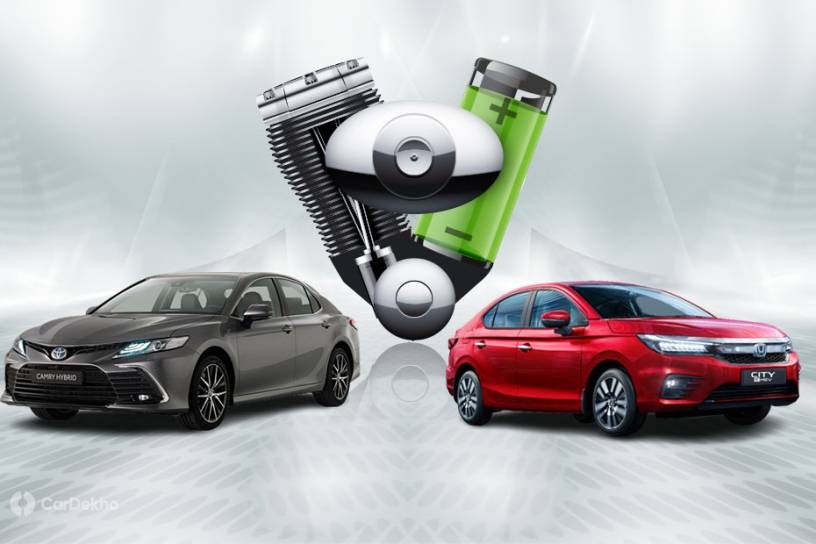How Japanese Brands Are Democratising Hybrid Powertrains In India
Modified On May 16, 2022 01:43 PM By Sonny
- Write a comment
The journey to clean mobility doesn’t necessitate jumping to a technology that currently lacks infrastructural support

In the context of electrified personal mobility, India tried to jump straight to EVs to keep up with the developed nations. This process meant skipping the hybrid phase and even the government did not accommodate this technology in its regulations for incentivising citizens to move towards electric mobility. However, Japanese carmakers like Honda and Toyota have taken it upon themselves to introduce Indian car buyers to hybrid technology as a stepping stone towards the seemingly inevitable future of EVs.
What’s special about these hybrids?

Maruti has been placing the mild-hybrid badge on its models for a few years now. That tech uses a small, low-voltage starter-generator that allows the combustion engine to be more efficient during start-up and initial propulsion. The mild-hybrid tech also offered some torque support to the engine during acceleration. While helpful, it is not electrified enough to be a major step towards cleaner mobility.
On the other end, we have plug-in hybrid technology that would face the same infrastructural challenges as EVs to fully utilise their electric components. Instead, the tech that seems most appropriate for the Indian market is the self-charging hybrid. That's exactly what brands like Honda, Toyota and Suzuki (through Maruti) are bringing to the masses in 2022.
What's the benefit of a self-charging hybrid?
While the exact technology varies between brands, the overall system of a self-charging hybrid uses a petrol-powered engine to generate electricity that powers the electric drive motor and charges the battery. This system allows the petrol engine to run at peak efficiency which lowers its emissions and maximises the fuel economy. Unlike mild hybrids, self-charging or strong hybrids are also capable of running in pure EV mode. While they don't have the range of plug-in hybrids, they still can run in the zero-emission mode.

The biggest advantage of a self-charging hybrid system is that it takes away any sense of range or charging-related anxiety that plagues the EV and plug-in hybrid technologies. It's just as practical to use as an ICE vehicle, especially in terms of refuelling. The strong hybrid even offers improved acceleration which is handy in most driving scenarios, while also being greener thanks to significantly reduced CO2 emission than comparable petrol or diesel models.
How have/will these brands change(d) things?

The self-charging hybrid technology is not new to India as it was offered in premium vehicles like the Toyota Camry and the Honda Accord (now discontinued). However, these models are priced well above Rs 35 lakh, putting them out of reach for most buyers. Now, hybrid technology is being offered at more affordable prices.

The Honda City e:HEV has become the first mass market hybrid in the country with a price tag of Rs 19.5 lakh (ex-showroom, Delhi). It is offered in a single, fully loaded variant with added features over the top variant of the petrol-powered City automatic for a premium of around Rs 4.5 lakh. Theoretically, the hybrid model could be even more affordable if offered with fewer cabin comforts and conveniences.
Related: Nitin Gadkari Takes A Look At The Honda City Hybrid
Next to bring a mass-market hybrid option to India is Toyota with a new compact SUV, codenamed D22. The carmaker has already announced its plan to invest thousands of crores into setting local manufacturing of its electrified powertrain. The high level of localisation allows hybrids to become more affordable. Additionally, the D22 will also be sold as a Maruti Suzuki model which promises high volume sales that also help reduce the final price of the relatively new tech in the mass market. In fact, these SUVs could undercut the City Hybrid too, thanks to economies of scale.
But what about the more affordable EVs?
Tata is the only brand in India offering EVs with a claimed range of over 300km that cost less than Rs 20 lakh. However, these EV variants are considerably pricier than their ICE counterparts, around 50 percent more expensive. In comparison, the City hybrid is around 30 percent more expensive than the equivalent petrol-automatic variant while also adding an ADAS feature suite. So, a hybrid variant of an affordable model will likely be cheaper than a pure-electric alternative.

Also, despite the claimed range, EVs priced around Rs 15 lakh are unlikely to deliver more than 250km of real-world driving range. This is unlikely to change anytime soon as the cost of EV batteries is projected to reduce over the next decade while carmakers are raising model prices multiple times a year.
The hybrid option is still expensive and would require a lot of running to justify its premium or the government reducing the tax on these greener models. Currently they are taxed at the same rate as their ICE-counterparts. But that's not the objective of a hybrid. It is the stepping stone in the transition towards clean mobility that also offers convenience and practicality while the supporting infrastructure for EVs is being developed.
Read More on : Honda City Hybrid Automatic
0 out of 1 found this helpful















